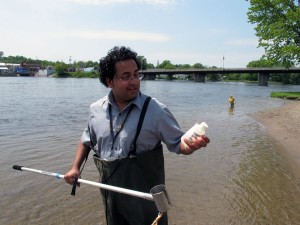Two local beaches closed from E. Coli contamination
By Steph Crosier

FRANKFORD, ON (30/05/2011) Nandu Latchman, student public health inspector, takes a water sample from the shores of the Trent River at Frankford Beach. The sample is put into a cooler and sent to Kingston for testing. Photo by Steph Crosier
Two local beaches are considered unsafe for swimming, says the Hastings and Prince Edward Counties Health Unit.
Wellington Beach and Centennial Park beach in Deseronto have been posted as unsafe for swimming due to high levels of bacteria.
Andrew Laney, senior public inspector, said the wet spring has led to high levels of E. Coli in the water.
“E. Coli is a bacterial indicator organism,” said Laney. “It’s found in the digestive tracks of people and animals. When you think E. coli you think of sewage. Obviously for health reasons you don’t want to be exposed to that.”
With cases of death in places like in Walkerton ON, and now in Germany, people get nervous about E. Coli but Laney said it’s not a major concern.
E. Coli results mostly from animals. Seagulls, for example, that hang around beaches for a long period of time can cause high levels of E. coli.
Beaches can be unsafe for other reasons including, heavy algae growth, wildlife deaths, and garbage on the beach, said Laney.
“You’re going to find a certain amount naturally in any surface waters like lakes and rivers,” said Laney. “We’ve got animals out there. But when it gets to a certain level that’s when you can start finding that you could have some health problems. Eyes, ears, throat, and nose infections – that sort of stuff.”
Inspectors test the waters at 20 different beaches in our area. They sample the water, keep it cool and then send it to Kingston for testing.
“We send it to Kingston because that is the closest lab,” said Nandu Latchman, a local inspector. “There is one in Peterborough as well.”
“So we have a standard, in the province,” said Laney. “100 E. Coli per 100 millilitres of water. If you exceed that level that’s kind of the break point. They feel that through analysis, if people are exposed to greater concentrations than that, they could experience some of those eye, ears, throat infections.”
Laney said posting a beach is not closing it.
“If it’s above our recommended limit than we would consider posting it. So when we say post, we post beaches, we rarely close beaches,” said Laney. “There is a bit of a distinction. We’re posting in the sense that we are giving a warning. We’ve exceeded a certain level, so we’re suggesting that at the point when we sampled your risk of infections are increased.
“In a sense we are not closing the beach because you could still be at the beach. We just aren’t recommending you spend long periods of time in the water, at that level. And its not a guarantee you’re going to be ill, it just increases your likelihood.”
Greg Campbell, a resident of Frankford, and his four-year-old daughter Alyssa , love coming to the Frankford Beach. He said he wouldn’t go into any posted beach water and is happy public health units do the tests.
“I think it’s great,” said Campbell. “I feel safer letting Alyssa swim at the beach knowing they check.”
 Print This Post
Print This Post






